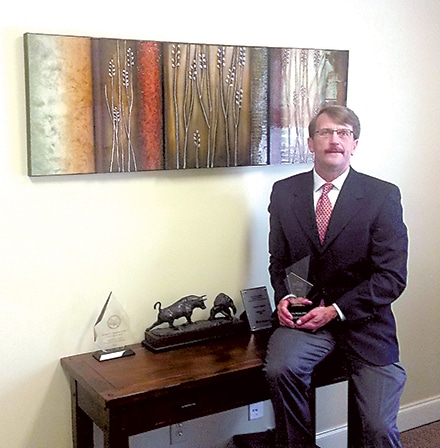
So says Wealth Advisor Jerry Hansen of Hansen Financial Services in Suwanee.
Given today’s workplace environment, it is a different world than the world of your parents and grandparents.
Today’s professionals are changing jobs more often, enjoying their mobility. You don’t see many who spend their entire working careers with just one company. A casualty of this new work trend is the corporate retirement plan.
“Getting into some kind of formal retirement plan is important, regardless of your age. You want to maximize earnings in any way possible. A lot of people are working well beyond the age of 65 these days. The key is to have a ‘game plan’, budget and put something away each month. No matter how little,” Hansen said.
“In 1983, I went to a seminar as a young man, and I could still see the speaker today, and the man conducting the seminar was silver haired and in his 70s and he said, ‘If you take nothing away from this seminar, take this, save 10 percent.’ It was the most-sound financial advice I had ever heard, and remember it to this day.” The lack of a retirement plan is not that uncommon as many Baby Boomers approach retirement. Hansen said establishing a plan, and sticking to it, is important. “Financial plans need to be written,” he said. “There is something that happens during that hand-eye process that makes the plan stick.”
It’s important to have goals and these goals need to be reviewed every year, Hansen said. “The key is to save, but if you can’t save 10 percent, save five percent. Put something away, anything that won’t take food off the table.”
Sooner is better, Hansen said, but it’s never too late to start saving.
“If you defer your social security beyond the age of 65, your benefits may increase by seven percent each year you defer. They say the new 70 is the old 65. Because people are living longer, some need to work beyond 65 as long as their health permits and it’s enjoyable. Budgeting is important. You have to be cognizant of your expenses.” Hansen said if someone’s budget is tight, they need to distinguish between what they want and what they really need.
“People are living very actively well into their 80s and even into their 90s. Retired folks need to understand their retirement may be lasting 25-to-30 years, and they need ongoing financial planning.”
A common planning mistake among retirees is they overspend for their dream home in retirement, and in 12-to-15 years they realize they overspent on that home, according to Hansen.
The days of paying off your mortgage and living mortgage free are waning.
“With interest rates today being as low as four percent, there is nothing wrong with entering your retirement with a mortgage,” Hansen said. “Many of us are changing the way we think about where we live and how we pay for it.”
With the change in the job market in the past generation or two, professionals have taken over control of their own retirement plans as opposed to the corporate pension. Gone is the lifetime job where you retire at age 65 after more than 40 years of working for the same company.
Gone is the retirement party and the gold watch. Gone also, is the pension on which your grandparents lived during the years of their retirement. Families lived in one town, one house and worked one job over the course of a lifetime. This isn’t your grandparents’ world anymore.
“Pensions are becoming a thing of the past,” said Hansen. “Boomers are approaching retirement age and the days of having a company based pension are waning.”
Hansen said, the 401K plans or other retirement savings funds has replaced his parents’ and grandparent’s pensions of a generation past.
“Today’s professionals want to be in control of their own financial investments.”
A Midwest native, who earned a Masters’ Degree from the University of Pittsburgh in 1995, Hansen started his career in insurance, eventually focusing on investment management.
Hansen, who has been a part of the financial planning industry since graduating from college in 1983, has weathered the ups and downs of market over the years. “My father was wealthy, but he eventually lost his fortune and died broke. I’ve been rich and I’ve been poor, and I don’t want to see others live in financial desperation.”
Hansen knew early on he wanted a career in finance and before the days of the Internet, spent a lot of time in his local library studying up on the trade and researching investments.”
“I lived through several bear markets,” he said. “I’ve invested during the 1987 crash and the 2008 downturn.”
The key to successful investing is to avoid the big hit. “When you invest money in retirement, there are fender benders and accidents,” Hansen said. “While you may lose a little with your investments from time to time, you want to avoid a big accident that may change your lifestyle.”
If you have questions about your financial future, whether you’re retired, a Baby Boomer nearing retirement, or a Gen X’er just getting started, it’s never too late, or too early to talk to a financial advisor about your investing options. For more information, visit www.jthlpl.com.

